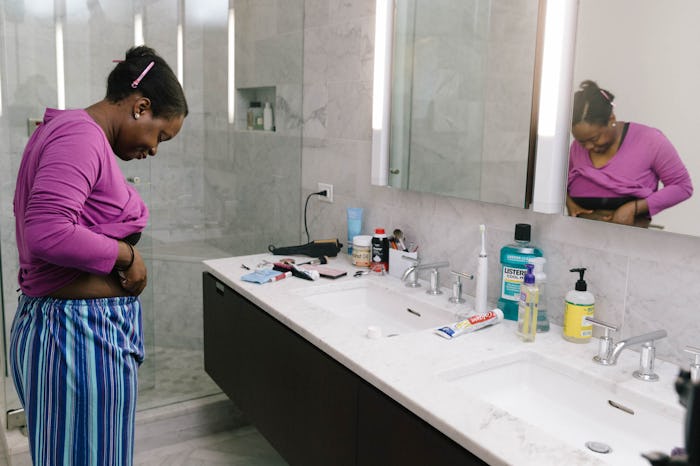Life
Here's How Pregnancy Will Actually Impact The Stretch Of Your Postpartum Skin
It's a huge shame that society doesn't love a postpartum body, and even more unfortunate that the realities of postpartum life are a mystery to many women. (It certainly was a huge surprise to me.) While a doctor and countless resources exist to guide you through your pregnancy and delivery, many women feel abandoned in the months after giving birth. What's up with my pelvic floor? When will I lose this excess weight? Does pregnancy cause loose skin? Here's a look at your post-baby belly, from the inside out.
Pregnancy can cause loose skin, essentially because your skin must stretch to accommodate your growing baby, reported Healthline. As Marie Jhin, MD, told WebMD, your belly is like a balloon. Once it expands and deflates, it won't go back to its original shape right away. After delivery, your uterus begins to contract, and your muscles struggle to repair themselves from the trauma of gestation and birth. Over the coming months, as you lose the rest of that pregnancy weight, loose skin is a visible reminder that your body won't heal overnight — and that's OK.
Laura Arndt, a Pilates instructor and fitness professional, as well as the creator of Matriarc, an app for postpartum healing through exercise and nutrition, explains to Romper in an interview that it's best to lose weight gradually and steadily to protect the skin's elasticity. If you hold onto the baby weight too long — for over a year, for instance — it will be harder for your stomach muscles and skin to tighten up again. "Your body is meant to expand, and then it’s meant to go back," she says. Which isn't to say you have to lose all the extra weight instantly. It's more important to take the long view, by eating right and easing into exercise intelligently.
The trouble is that most women don't know the best ways to care for themselves after pregnancy. After your OB-GYN clears you for sex and workouts, you might not see them again, and, as Arndt explains, there's no medical expert dedicated to helping you through the postpartum period. Instead, you're bombarded by images of celebrities flaunting perfect, impossible bellies a month after giving birth. Fitness apps targeted to postpartum women focus on calorie burning and weight loss, but ignore potentially long-lasting issues like pelvic floor problems, incontinence, and rectis diastasis.
But here's the thing. No matter how much you want to tackle loose skin or a saggy belly, you can't jump back into your old abdominal exercises immediately, explains Arndt. "Through my training and experience, I came across a lot of exercises that could really benefit moms, but also a lot of exercises that were contraindicated," she says. "Especially in those first six months post-delivery, there’s a lot of things that women shouldn’t be doing."
Take crunches, for example. Two-thirds of pregnant women experience abdominal separation during pregnancy — the fancy name for it is diastasis recti — and exercises that build abdominal pressure, like those gym-class crunches, can actually worsen separation. On the other hand, targeted exercises can literally help the abdominal muscles heal. Arndt's Matriarc app is unique for understanding that a three-month postpartum body is very different from a seven-month one, and that even before you try to lose the baby weight or tighten your skin, you should focus on healing from the trauma of pregnancy and birth.
Of course, some issues — like persistent loose skin, sagging breasts, or a differently-shaped belly — might never go back to the way they were, and that's OK, too. Another crucial part of the postpartum journey, for better or for worse, is learning to accept new changes and a new shape. Your best bet is to ease into exercise, care for your core and your pelvic floor, and eat well throughout the first post-pregnancy year.
Check out Romper's new video series, Bearing The Motherload, where disagreeing parents from different sides of an issue sit down with a mediator and talk about how to support (and not judge) each other’s parenting perspectives. New episodes air Mondays on Facebook.
